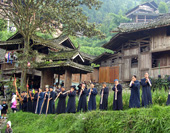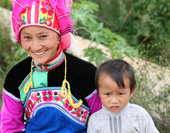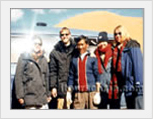
Dong People Guide
-Travel to Dong People According to the Guide of 1990 census, there are about 2,514,000 Dong in China. They live in remote mountain valleys along meandering streams in Guizhou, Hunan, Guangxi provinces of southwest China. Some Dongs also live in Hubei province. Dong communities living in different areas vary considerably in both customs and traditional clothing styles. References to the Dong can be found in Chinese historical sources as far back as the Qin dynasty (221-206 B.C.). The Dong are believed to have originated from a branch of the ancient "Luo Yue" people and are known to have lived in Jiangxi and Guangdong Provinces during the end of the Eastern Han dynasty (A.D. 25-220).Today the Dong may be classified into two major groups, the northern and southern.
According to the Guide of 1990 census, there are about 2,514,000 Dong in China. They live in remote mountain valleys along meandering streams in Guizhou, Hunan, Guangxi provinces of southwest China. Some Dongs also live in Hubei province. Dong communities living in different areas vary considerably in both customs and traditional clothing styles. References to the Dong can be found in Chinese historical sources as far back as the Qin dynasty (221-206 B.C.). The Dong are believed to have originated from a branch of the ancient "Luo Yue" people and are known to have lived in Jiangxi and Guangdong Provinces during the end of the Eastern Han dynasty (A.D. 25-220).Today the Dong may be classified into two major groups, the northern and southern.
 The Dong language is the primary means of communication for the people. They have their own spoken language, but use the Han characters for writing. There are basically two dialects, northern and southern for the Dongs. The Northern Dong is under the constant impact of Han culture and has lost many of their traditions, whereas the Southern Dong is able to retain their culture. Traditionally, the Dongs treat their guests to a specialty drink called youcha, or oil tea, prepared by pouring boiling tea into bowls containing a mixture of such ingredients as glutinous rice, fried peanuts, soybeans, chopped green onions, spinach, lean meat and so on. The Dong have an unusual custom of planting 18 fir trees when a child is born - these trees become a resource for building a house when the child eventually gets married. After marriage, women live with their parents until after the birth of the first child.
The Dong language is the primary means of communication for the people. They have their own spoken language, but use the Han characters for writing. There are basically two dialects, northern and southern for the Dongs. The Northern Dong is under the constant impact of Han culture and has lost many of their traditions, whereas the Southern Dong is able to retain their culture. Traditionally, the Dongs treat their guests to a specialty drink called youcha, or oil tea, prepared by pouring boiling tea into bowls containing a mixture of such ingredients as glutinous rice, fried peanuts, soybeans, chopped green onions, spinach, lean meat and so on. The Dong have an unusual custom of planting 18 fir trees when a child is born - these trees become a resource for building a house when the child eventually gets married. After marriage, women live with their parents until after the birth of the first child.
Dong villages have a uniqueness that separates them from those of neighboring nationalities such as the Zhuang, Miao and Yao. A drum tower, with its formation of tiered, multistory roofs, dominates the landscape of a typical Dong village. The tower, the tallest and most revered structure in the village, is constructed without nails, a testimony to the architectural skills of the Dong. As a Dong saying goes, where there is a river, there must be a bridge. In fact, whenever the Dongs live in compact communities, there will be various bridges. The Dongs' favorite musical instrument is the Lusheng, a wind instrument with a reed that has developed a fairly sophisticated form through the efforts of several generations of Dong musicians. Lusheng dance originated in a religious rite held before spring ploughing to pray for fine weather for crops and good harvests.
More Attractions in Guizhou Province
Your Question & Quick Answer*We welcome and appreciate your questions & reviews
Booking Procedures | Terms & Conditions | Payment Methods | Links | Site Map | About Us | Contact Us | Travel Agent
Copyright 2008, All rights reserved.. itourbeijing.com professional china travel guide and china travel service
TEL: 86-10-85711972 (Universal) 1-888-288-9328 (North America) E-mail: contact@itourbeijng.com
Tours Index | China Tours | Beijing Tours | Xi'an Tours | Shanghai Tours | Guilin Tours | Tibet Tours
China Travel | Beijing Travel | Shanghai Travel | Xi'an Travel | Guilin Travel |Beijing Map
China Golf | Beijing Golf | Shanghai Golf | Xiamen Golf | The Great Wall Travel | Yangtze Cruise | Travel Picture



